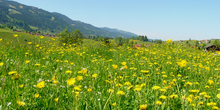Biodiversity
Our Work
Latest in Biodiversity
-

Natura 2000 and Jobs – Scoping the Evidence
The European Natura 2000 network provides job opportunities in sectors ranging from conservation and restoration, agriculture, forestry, fisheries to tourism, recreation, and health.
-
Towards sustainability: Future policies for European livestock
The CAP is failing to reward adequately those livestock farmers who produce public goods. Brexit and CAP reform are opportunities to do better.
-
What can the UK do to reduce environmental risks from pesticides?
The UK’s action plan on sustainable use of pesticides aims to reduce the risks and impacts of pesticide use on the environment and encourage alternative approaches and techniques. How is the UK doing?
-
Will Brexit affect the UK’s actions to reduce the environmental impacts of pesticides?
The UK’s action plan on sustainable use of pesticides aims to reduce the impacts of pesticide use on the environment and encourage alternative approaches. How is the UK doing and how could Brexit change the government’s approach to pesticides?
-
Fitness Check of the Birds and Habitats Directives
The Nature Directives (i.e. Birds Directive and Habitats Directive) are the key instruments of EU environmental policy; the Fitness Check support study, carried out by Milieu, IEEP and ICF for the European Commission DG-ENV, examined their effectiveness, efficiency, relevance, EU-added value and their coherence with the wider acquis.
-
Are Ecological Focus Areas delivering for biodiversity?
Ecological Focus Areas are intended to safeguard and improve biodiversity on arable farms in the EU. What evidence is there that they are actually delivering biodiversity on farmland?
-
Ecological Focus Areas – what are their impacts on biodiversity?
Ecological Focus Areas are intended to safeguard and improve biodiversity on arable farms in the EU. This IEEP study for EEB and BirdLife examined the evidence for potential biodiversity impacts on farmland, taking into account how the areas are being managed.
-
Improving environmental financing via result-based agri-environment measures
A new article by IEEP explores the use of result-based agri-environment measures in the region of Baden-Württemberg, Germany. The study shows that result-based schemes can increase the environmental effectiveness and conditionality of the EU Common Agricultural Policy.
-
CAP greening: what are its environmental prospects?
A significant injection of money was agreed for ‘green’ farming practices under the recent CAP reform. This report examines the environmental impact these measures are likely to have on the ground and concludes that Member States’ implementation choices appear to have much diminished the chances of the greening measures delivering significant additional environmental benefits.
-
Result-based agri-environment measures: market-based instruments, incentives or rewards?
Result-based schemes are innovative agri-environment measures, which remunerate farmers only if they can demonstrate to have achieved the desired environmental goal. This is different from ...
-
Evidence before ideology
The latest edition of IEEP's newsletter is now available. David Baldock argues that in 2015 solid evidence rather than political fashion will be required in scrutinising EU policy and economic performance. Also: fossil fuel subsidies; allocating fishing quota; and the launch of our new training programme.
-
The Manual: Chapter 13 - Sectoral policies
This is a chapter of IEEP’s Manual of European Environmental Policy. This chapter sets out the development of some of the most important links between EU environmental policy and other policy areas, such as agriculture, forestry, fisheries, transport, trade, and so on.
-
Whither the new Commission?
IEEP’s David Baldock gives his take on the new Commission in the latest edition of our newsletter. Read about how IEEP is raising ambition for the next EU climate and energy package, plus: priorities and policy options for a circular economy, payments for farmland biodiversity achievements, biodiversity proofing EU spending, and more.
-
Guidelines for biodiversity proofing the EU budget
This report provides a practical framework to ensure that spending under the EU budget has no negative impacts on biodiversity, and that spending under the EU budget is overall supportive to achieving the biodiversity targets.
-
Guidance handbook for financing Natura 2000
An updated ‘Financing Natura 2000 Guidance Handbook’ aims to inform national stakeholders about opportunities for financing the management of Natura 2000 sites through various EU funds during the 2014-2020 period.
-
New guidance for farmland management in Natura 2000
New guidance for farmland management in Natura 2000 gives agricultural and conservation authorities a step-by-step guide to management and funding measures and practical advice on habitat and species management.
-
High Nature Value farming throughout EU-27 and its financial support under the CAP
This study reviews Member States’ estimates of the extent of HNV farmland and use of RDP measures and the CMEF indicators, then identifies future priorities for CAP support for HNV farming and discusses the support opportunities under the reformed CAP. It offers detailed new evidence about the combined effect of Pillar 1 and Pillar 2 CAP payments on the economic and environmental viability of a typical HNV farming system in three Member States.
-
New report: High Nature Value Farming in the EU
Member States need to make the most of the opportunities under the new Common Agricultural Policy if the declines in HNV farming, critical for meeting our 2020 biodiversity targets, are to be halted.
-
Policy Options to Achieve No Net Loss of Biodiversity
A new IEEP led study concludes that mandatory biodiversity offsetting is required to achieve no net loss of biodiversity in the EU, but its introduction could be counter-productive if it is not introduced cautiously and regulated strictly. The first priority should be to better implement existing nature conservation measures.
-
Environmental policy and the UK’s review of the EU Balance of Competences
The UK Government’s Balance of Competences review has now taken evidence on 25 subject areas, including the 6 with the most relevance for the Environment. We take stock of the IEEP’s contributions, and consider what a possible UK renegotiation might mean for the environment.
Highlights
-

What can the UK do to reduce environmental risks from pesticides?
The UK’s action plan on sustainable use of pesticides aims to reduce the risks and impacts of pesticide use on the environment and encourage alternative approaches and techniques. How is the UK doing?
-

Ecological Focus Areas – what are their impacts on biodiversity?
Ecological Focus Areas are intended to safeguard and improve biodiversity on arable farms in the EU. This IEEP study for EEB and BirdLife examined the evidence for potential biodiversity impacts on farmland, taking into account how the areas are being managed.
-

CAP greening: what are its environmental prospects?
-

Result-based agri-environment measures: market-based instruments, incentives or rewards?
-
Biodiversity proofing of the EU budget
